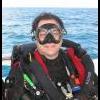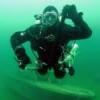My point wasn't so much the depth, any depth of water is an issue when your face is submerged in it and you can't breathe.
.
The intresting thing with rebreathers is unlike scuba you have more time at depth then in the shallows to sort issues where as OC becomes more dangerous as you go deeper
Like SDM, once I get onto CCR and out of classes, I figure that I will be diving solo with it. We don't have many CCR divers up here and I don't feel like hunting for dive buddies. If something goes wrong down there, it will be my fault in some way, shape, or form.
I think this is where alot of the solo stuff begins...noone to dive with much like the early scuba days.
When the type of equipment is a bit more unreliable than OC, you need to be on your toes for Mr. Murphy. If you want a minimum of types of issues, I would recommend staying with OC. While OC doesn't provide you with the number of bailouts that CCR does, it doesn't provide you with all of things that can go wrong.
I don't think CCR is more unreliable but the issues one faces might overlap some OC stuff but it has it's own particular demons.As in scuba understanding the strenghths,wealnesses and limitations allows one to make choices(hopefuly the right ones)
Hmmm. Where to start? How about with a real world example involving myself.
Suddenly, one of my three oxygen sensors seems not to be providing a read out. I confirm this by looking at both the primary and secondary hand sets. Okay, what do I do now?
I have two fully functioning hand sets and my HUD. Two out of three sensors is good enough, isn't it? After all, we are only going to 80 feet anyway. I mean, if one more sensor fails, I can just bail out to open circuit, aborting the dive, right? So, what is the big deal if I do the dive?
My decision: I tell everyone to go ahead. I take off all my gear, break down the unit, and I change out a simple part. I put everything back together, put back on my gear, and I am in the water within 20 minutes. I still get a good half hour on the drift dive though I have surely missed out on some of the good stuff.
There are some people that would have done the dive. Don't believe me? It happens everyday. One of the frequent causes of CCR accidents and deaths: Diving with known equipment issues.
I have another theory. However, I can't say that this is fact. It's just my own belief.
ECCRs are great because people think that they are like a Ron Popeil device: "Set it, and forget it." It is like the autopilot of the rebreather world. The problem is that using automatic settings coupled with distraction and possible equipment failures can lead to hypoxia, a lack of oxygen. Then, add to this the lack of practice with regard to skills. Throw in a little mix of pushing scrubber limits and another no-no or two. The result can be fatal. Guess what? This also happens everyday except that many get away with it for many times. All it takes is once for you to get killed from taking these kinds of chances.
I fly my Optima on manual all the time. I think that I let it go on automatic a total of one time since I got the unit. Even then, I did so just to see what it would be like. Believe it or not, I actually prefer using it manually. So, I feel no loss by not going with the auto pilot setting.
My belief is that this keeps the user actively involved in the process and operation. Constant vigilance becomes a habit. Sticking with the program about dos and don'ts on top of this will reduce the chance of accidents tremendously.
To anyone wondering why this is an issues,with only two sensors working and you get two different readings how do you know which one is right?
The one I see up here is people pushing the scrubber life to the max trying to get every last min. out of it.The stuff is cheap,esspcially with all the money your saving on helium.
6Gill is diving a KISS. So, he can tell you more about it. They are built well, and they are simple. For the money, they are a great unit.
I write something but getting caught up after being away...

















